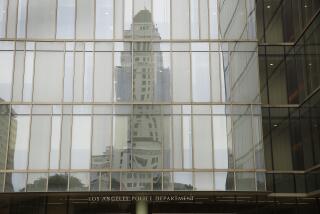Informant Told Tester of Lying Back in 1987
- Share via
When long-time jailhouse informant Leslie White told a polygraph examiner for the state attorney general’s office in early 1987 that he had committed perjury numerous times, no investigation resulted, it was learned Thursday.
The polygraph examiner said in a telephone interview that he considered White’s statements to be unverifiable.
Other officials in the attorney general’s office backed the examiner’s assessment, saying it would have been irresponsible to have alerted other law enforcement agencies about White because White revealed no specifics.
White told the polygraph operator, George Johnson, that he committed perjury no more than 10 times before 1986.
Feared Turmoil
Martin Ryan, a supervisor assigned to the attorney general’s Bureau of Investigation, said Thursday: “If George (Johnson) was to report that this guy has perjured himself 10 times and announced that to California law enforcement, you can imagine what sort of a turmoil that would cause . . . trying to ferret out specifically what cases he was talking about.”
Ryan said “a lot of manpower and energy” would have been expended without a specific direction.
White, who has testified as an informant since 1977, is the central figure in an extraordinary review by the Los Angeles County district attorney’s office of every jailhouse informant case of the last decade. Senior prosecutors in Los Angeles have said they want to make sure that no one was wrongly convicted based on the perjured testimony of jailhouse informants.
The district attorney’s office began its review after White demonstrated in late October that he could gather enough information by telephone from law enforcement authorities to convincingly fake the confession of a murder defendant he had never met. White said he had never used the technique but had seen others use it. He declined to name them.
In the 1987 polygraph exam, Johnson said he asked White how many times he had perjured himself and White said he was sure it was fewer than 10 times.
Johnson said he was developing what polygraph operators call a “control question” to ask later when White was actually hooked up to the lie detector.
A control question is designed to hit a nerve, causing a physiological reaction that the examiner can compare to the subject’s reaction to “relevant questions.”
Polygraphs measure changes in blood pressure, breathing and galvanic skin responses.
In this case, Johnson said, the relevant question dealt with White’s knowledge of a reported threat on a law enforcement agent’s life by a leader of a California prison gang.
As his control question, Johnson asked: “Other than those 10 times before 1986, did you ever commit perjury while testifying?”
White answered no, Johnson said.
Because he showed greater fear in response to the perjury question than in response to the relevant question, Johnson said he was able to determine that White was telling the truth about the relevant question.
But Johnson said he was unable to tell whether White was truthful about perjuring himself.
“The only thing I know is that that was the area that he feared the most,” Johnson said.
He said there could have been a variety of reasons for White’s concern.
Among them, he said, were that White could have been on “an ego trip, that he wanted me to think he had committed perjury when he had not.” He also noted that White could have been referring to inconsequential mistakes he had made on the witness stand, such as being wrong about a time of day.
Johnson said he did not ask White for details of the perjury “because those were not the issues I was testing him on.”
As a practical matter, said Johnson’s supervisor, Sam Lister, Johnson, by law, would not have been able to test White on details of his supposed perjury without first telling him that he was suspected of the crime of lying under oath and obtaining White’s written consent to a polygraph examination on that issue.
Johnson’s written report on the polygraph test did not mention the perjury question, officials said.
More to Read
Sign up for Essential California
The most important California stories and recommendations in your inbox every morning.
You may occasionally receive promotional content from the Los Angeles Times.













